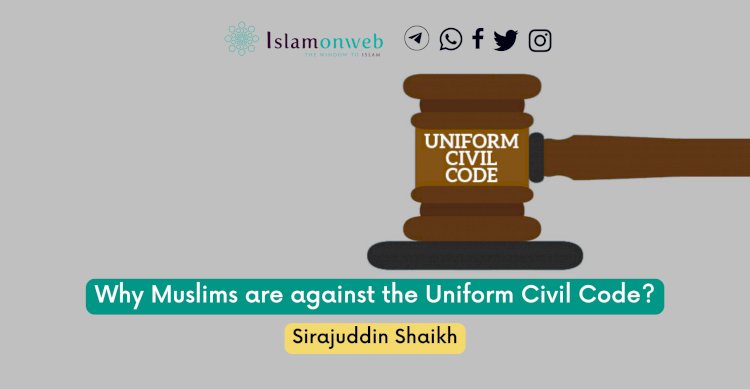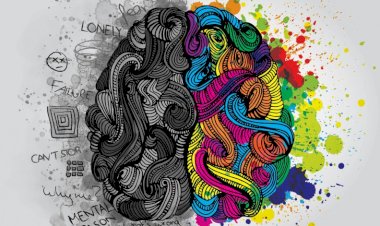Why Muslims are against the Uniform Civil Code?
The idea of Uniform Civil Code has once again come into limelight after June 27. Indian prime Minister Narendra Modi, advocating UCC in a public meeting of BJP functionaries in Bhopal, addressed that the country could not have different laws for different categories of citizens. Exemplifying the notion, Prime Minister Modi further added that as a family would not function well if there are different rules for every other member in it, similarly the country would not function smoothly under such a dual approach system.
Ever since, the notion has been burning in debates. The proponents of the UCC are claiming that the provision would promote generate equality, social justice, and national integration, which could be a big win for the nation, whereas the opponents are seemed to have been hurt by the idea of a unified set of laws on diverse religious communities, as it would infringe upon their rights and undermine an integral part of cultural autonomy and religious freedom. Therefore, it has been a matter of debate for both the sections to realize where would lie the best interests of people.
Though Muslims have been seen as the face of the opposition in this matter, it is arguably assumed that the matter is only concerning to the Muslim sections, but, as a matter of fact, it is indeed unjustifiable to portrait it as a 'Muslim issue' as it is expected to be affecting the entire social stratum of the country as a whole including the hundreds of tribal communities who have their own socio-cultural identities. Stating the Uniform Civil Code as 'neither suitable nor useful for a vast multi-religious country like India', the All India Muslim Personal Law Board said: India is a multi-faith country, and every citizen is guaranteed to practice and profess his faith and religious beliefs, and to act on and preach the same."[i]
Furthermore, all major Muslim organizations have collectively issued a joint statement and voiced against the imposition of the UCC saying that the government should respect the religious freedom enshrined in the constitution and appealing the Muslims to send their objections to the law commission before July 14 to ensure that the government repeals the law-making idea of Uniform Civil Code. This join statement was signed by figures of different denominations as well as organizations including Maulana Khalid Saifullah, president of All India Muslim Personal Law Board, Muhammad Asgar Ali Imam Mehndi, President of Ahle Hadith, Maulana Arshad Madani, President of Jamaat Ulema-e-Hind, Maulana Mahmood Madani, President of Jamaat Ulema-e-Hind and Sadatullah Husaini, President of Jamaat-e-Islami.
Grounds of Muslims' refutation
There has been discussion over the UCC's suitability as a civil code for a nation that is home to people of different castes, tribes, and religions for a long time. All the minorities in general as well as the Muslims in specific are against this concept of Uniform Civil Code as it is against the fundamental right of the constitution. Articles 25 to 28 of the Indian Constitution ensures that every Indian has the right to freedom of religion. Under Article 25[ii], each and every citizen is entitled to the freedom of conscience, as well as the right to profess, practice, and spread their faith, under Article 26[iii], every religious denomination is granted the following privileges of subject to morality, health, and public order, under Article 27[iv], it is prohibited to take tax that directly supports the promotion and/or upkeep of a specific religion or religious denomination, and under Article 28[v], it enables the dissemination of religious teaching at educational institutions run by religious organizations. Wouldn't it be paradoxical in nature that the government is imposing the Uniform Civil Code to ensure the concept of equality which has been enshrined in the Fundamental Rights of Articles 14-18 at the price of freedom of religion which has also been endorsed by the constitution under the same part III of India constitution under Article 25-28? Therefore, if the constitution ensures the practice of religion in its entirety, what kind of equality these people are talking about to ensure with the introduction of the Uniform Civil Code.
Another matter that surrounds the Muslims' refutation against the Uniform Civil Code is the absence of compatibility with Sharīʿa Law. Though Sharīʿa Law, a set of religious regulations governing the lives of Muslims, are the derivatives of religious precepts of Islam and founded on the sacred scriptures of the religion, particularly the Holy Quran and the Sunnah of the Messenger of Allah ﷺ, Muslims would never agree upon to compromise with its practice or sanctity. It would sometimes be bearable to Muslims that a practice or a ritual of any particular community which is not from the Quran or the Sunnah is being snatched for any humanitarian ground, but Muslims can't stand that someone is playing with their Sharīʿa even for a matter of minutes. The concept of Sharīʿa Law is universal and thus wherever mentioned it is meant to be what is derived from the Quran and the Sunnah, but when it comes to India, it entails some specific provisions and that too of civil codes. In India, Sharīʿa Law refers to the Muslim Personal Law (Shariat) Application Act, 1937 which governs the matters of marriage, divorce, succession and inheritance of all the Muslims in India and doesn't entertain the penal codes or the matters of penalty as mentioned in the Sharīʿa Law in general.
Therein, the Muslims are against the religiously-political concept of the Uniform Civil Code as it goes against the Sharīʿa Law and targets the Muslims in guise of rights to equality to force them to lose their own entity/identity of religious practices in order to maintain social security of the nation.
Answers to the slanders
Now when Muslims are the face of opposition in terms of rejecting the idea of the Uniform Civil Code, there are several questions that the opponents of the UCC are asking to defame Islam and Muslims as a medium of unequal approach towards male and female. Notwithstanding with the understanding of Muslims points of refutation, there are few more points that are to be answered in order to create a proper picture of Islam's social security approaches and Muslims' grounds of objections.
If untouchability, why not UCC?
While talking about UCC, one of the major questions that the opponents of the Uniform Civil Code often ask is if untouchability could have been abolished under the humanitarian ground, why can't UCC be brought for the same cause. These people say that untouchability is from the underlying beliefs of the caste system which is from the Hindu religion. While reading about the matter, one would come to know that there are 4 varnas in Hindu religion: Brahmins (learned scholars), Kshatriyas (warriors), Vaishyas (business, farming or rearing cows) and Shudras (service-oriented). Among these four varnas, Shudras are the ones who are considered to be the untouchables as they are uneducated and do minimal jobs. But looking into it, one would further know that there is no direct mention of it and it only came into existence when the caste system was promoted among their practices. Rather, what could be found in shastras is to respect Shudras and not insult them. In chapter 3 of Manu Smriti, it has been mentioned: "The guest who may be a Vaishya or Shudra should also be treated respectfully and fed sincerely.[vi]" whereas in chapter 4 it has been mentioned: “Insulting one on the basis of disabilities, lack of knowledge, age, wealth or status of birth is strictly prohibited.[vii]" Robert Deliege in his research The myths of the origin of Indian Untouchables said that untouchables believed that they were once respectable individuals who after having a misunderstanding in the past, brought them to a marginalized position. "This kind of ambiguity is common for untouchables in Indian society as a whole." Now when it is clear that it was a mere social practice and even the religious scriptures didn't support them, then there is no point in saying if untouchability, why not UCC.
Why not penal code in Sharīʿa Law?
One more thing, which is often being asked is if Muslims want to ensure the safety of their civil rights enshrined in the Sharīʿa Law, why don't they follow the penal codes as per their Sharīʿa commandments. As mentioned earlier, Sharīʿa Law in India referred to Muslim Personal Law (Shariat) Application Act, 1937 which is inclusive of only civil matters like marriage and inheritance. Therefore, if they (Muslims) can be Muslims and they are not hurt by not following penalty rules of Sharīʿa, then they would definitely be Muslims even when they don't follow civil codes and they shouldn't be hurt by then too, after all the changes are meant only for the betterment of society and nation. While talking about penal codes, one needs to understand that the application of penal codes can only be smoothly executed in an Islamic state but civil codes are rules of personal execution and can be done without involvement of any Muslim ruler or Islamic state.
If it is further asked why can't qazis or scholars apply it under their supervision? To understand, one would have to ascertain that there is a big difference in civil codes and penal codes. In civil code, the dealings like marriage, inheritance, and divorce are subjects of Muslims involvement. Under any circumstances, there would not be any angle where a non-Muslim would be there in these matters, but in penal codes even non-Muslims can be there. Suppose, if a Muslim by mistake kills a non-Muslim, harms someone bodily or damages property, then as per law he would have to pay Blood Money (diyāt) to the victim or heirs of the victim. But would a non-Muslim agree upon taking diyāt for such crimes as their religion doesn't sanction such penalties or would they ask for the death penalty instead. Similar would be the case when a non-Muslim would steal something from a Muslim, would amputation of hands be executed for such cases of inter-religious crimes. This is the reason penal code is not applicable in India and Muslims are not demanding for it.
Muslims don't want equality?
There are several such questions that the opponents of the Uniform Civil Code are coming up with. They are saying that Muslims don't want to create an ambience of equality where males as well as females can live equally and ensure their rights under the provisions of the constitution. Here, again the matter would be of Islamic Sharīʿa that if Islamic law has designated something for someone, it would be under some wisdom that we may not know and thus that doesn't mean Islamic doesn't want to ensure equality. As in case of inheritance, for instance, a son would inherit double of a daughter as he would have several obligations to shoulder in family as well as in personal life. In fact, Islam has fixed provisions as per equity not as per equality.
As in case of polygamy, opponents are claiming that Muslims are also not in favor of this law because the provision of polygamy for the males would be snatched. But as per a report of National Family Health Survey (NFHS) the custom of polygamy is as prevalent among other communities as among Muslims. As per this data of NFHS from 2019-20, the prevalence of polygamy was 1.9% among Muslims, 1.3% among Hindus and 1.6% among other religious communities. Even after the practice of polygamy is prohibited among other communities as per the constitution, it is as common as among Muslims. Then on what basis these people are yelling at Muslims that they are against the UCC to practice polygamy and if UCC comes, this practice would be abolished.
Conclusion Note
There is nothing wrong with ensuring equality in the nation which has been enshrined in the constitution, but if it is at the price of religious freedom, sentiments would hurt and people would find it unhealthy. The case becomes quite severe when it targets a specific community for the sake of political agenda. In the days to come, to ensure huge vote banking, the BJP government would not leave any stone unturned to stigmatize Islam and Muslims and with the Uniform Civil Code their half work has been already done for the 2024 general election.
It is high time for other communities to realize that the UCC is never a mere Muslim Issue, rather it would affect the entire social stratum of the country as a whole. If by chance, it is enforced in the nation, there wouldn't be any window left to say that religious freedom is not granted anymore. After all, if the mother of the house (constitution) is ready to provide respective provisions (Personal Laws) to different members of the family (religions) as per their need, outsiders shouldn't say that the house wouldn't go for long and thus the mother should deal with everyone equally. Rather, the outsiders better say nothing as it would sometimes dismantle the smoothly going environment of the house.
References
Daliege, R. (1993, September). The Myths of Origin of the Indian Untouchables. MAN, 28(03), 533-549. Retrieved July 10, 2023, from https://www.jstor.org/stable/2804238
Sharma, T. (2020, September). Uniform Civil Code: A detailed analysis. Pen Acclaims, 12. Retrieved July 10, 2023, from http://www.penacclaims.com/wp-content/uploads/2020/09/Tanya-Sharma.pdf
The Indian Express. (2021, November 21). Uniform Civil Code not suitable for multi-religious country like India: AIMPLB. The Indian Express. Retrieved July 10, 2023, from https://indianexpress.com/article/india/uniform-civil-code-not-suitable-for-multi-religious-country-like-india-aimplb-7634374/
Nagarajan, R. (2022, July 28). Multiple wives most common among tribals: NFHS data | India News. Times of India.
Raza, S. (2023, July 7). Muslim organisations issue joint statement, voice opinion against Uniform Civil Code. India TV News.
Endnotes
[i] ABP News Bureau. (2021, November 22). All India Muslim Personal Law Board AIMPLB Rejects Uniform Civil Code For Multi-Religious Country Like India. ABP LIVE. Retrieved July 10, 2023, from https://news.abplive.com/news/india/all-india-muslim-personal-law-board-aimplb-rejects-uniform-civil-code-for-multi-religious-country-like-india-1494901
[ii] Freedom of conscience and free profession, practice and propagation of religion.
[iii] Freedom to manage religious affairs.
[iv] Freedom as to payment of taxes for promotion of any particular religion.
[v] Freedom as to attendance at religious instruction or religious worship in certain educational institutions.
[vi] (Manu Smriti: 03/112)
[vii] (Manu Smriti: 04/141)
Disclaimer
The views expressed in this article are the author’s own and do not necessarily mirror Islamonweb’s editorial stance.
3 Comments
-

-

In olden days Muslim kings used have N number of wifes and affairs..So they inaugrated this Sharia law(Muslim Personal Law) to be benefited of their personal. Now there are no kings who are Ruling in muslims ,we are common people,we should have humanity, Bharat is shown as an example of Cultural country where women are protected with their rights,laws .Bharat shouldn't have a culture like foreign countries about Marriage, divorce etc.. Laws which are implemented towards Females they too should be benefited like males.Regardless religion even muslim Male should protect Female towards their marriage.
-

There should be equal rights to muslim female too along with men in this country..As there can take advantage of personal laws of Muslim in marriage, divorce. Every muslim male think can marry N number of females or have legal affairs...India is secular and democratic country where all religions are combined..When muslim males want their identity/dignity degrading females they can form a special country where they can form their own Rules and Laws..Females should also have their rights and place in constitution and in Indian Law
























Leave A Comment